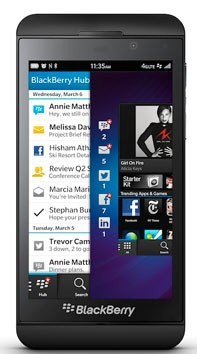BlackBerry, HTC, Nokia: Which will be around at the end of your two-year contract?

As a smartphone enthusiast, I buy and use most of the latest and greatest smartphones. Thus, I am often asked by family, friends, and readers what device they should buy. While each of us has different needs and desires, it is easy and safe to recommend an Apple iPhone or Samsung Galaxy device. What about other companies who specialize in just making phones?

Many consumers upgrade when subsidies become available to them, and are looking for a device to be supported for at least the two-year length of the contract. Apple and Samsung currently dominate the smartphone market and have other profitable businesses other than smartphones, so you can rest assured they will be around for years to come. LG and Sony are significant electronics companies, so it's also a safe bet to buy their smartphones. They both have some unique offerings and new products that are solid choices.
When I look at BlackBerry, HTC, and Nokia, three companies that only make smartphones, I have confidence in a couple being around at the end of 2015, but am concerned about the other. They all have the potential to succeed, and in my opinion, none are guaranteed success in today's highly competitive market. I personally would love for all to be around years from now because I think we benefit from better products with competition.
BlackBerry
RIM, now named BlackBerry, took most of 2012 off to focus on developing its new BlackBerry 10 OS, and I had serious doubts about its ability to survive in the smartphone market. BB10 is out, the Z10 is available around the world (including on three US carriers), and the Q10 hardware QWERTY device is coming soon. BlackBerry has made leadership changes, i streamlined operations, and released a fresh and powerful new mobile operating system.
BlackBerry has a focused strategy, and its success rests solely upon itself. It has a solid marketing campaign in effect, a wide range of carriers signed up and selling its devices, and is bringing good applications to BB10 on a regular basis. I personally enjoy using the Z10, and as long as a person is open to a new user experience, the Z10 is a solid purchase. I am most confident in BlackBerry continuing to turn the tide and be a successful smartphone company for years.
HTC
There is no doubt in any reviewer's mind that the HTC One is an amazing piece of hardware that many have stated is the best smartphone they have ever used. Making great hardware has never really been HTC's problem, but getting those devices into people's hands and continuing to offer timely support have been issues.
HTC continues to suffer losses in revenue, and despite still showing a small profit, my confidence in its long-term success has waned. I have been a fan of HTC products and actually like its Sense UI, for the most part. It now has a fantastic piece of hardware that is launching next week on US carriers, and even has a plan for some marketing in a few major cities.
Despite the HTC One and planned Live Experience Tour, it is going to take more than a single device to regain its past success. Apple has shown success with a single device, but it also dictates the experience to the carriers, provides regular updates to devices around the world and across carrier boundaries, has a local retail presence to promote devices and support them, and has a marketing strategy that can't be matched.
HTC also makes Windows Phone devices, but they seem more like an afterthought than a focused effort, and Microsoft's mobile platform hasn't gained much smartphone market share. Microsoft wiped the slate clean going from Windows Mobile to Windows Phone 7, and then did a partial reboot again with Windows Phone 8. It is possible that Windows Phone Blue or whatever the next version is will again prevent existing owners from updating, and this kind of control by Microsoft makes HTC and other manufacturers subject to its whims.
At this point in time, I honestly don't know if there is anything HTC can do to turn the tide and am interested in hearing what you readers think it can do. Samsung is getting ready to roll out its Galaxy S4 and will sell millions of the device. Apple is likely to also soon release another iPhone that will sell millions in the opening weekend. I have a tough time recommending that family and friends buy a new HTC device, despite its leading hardware design, because I don't know if it will be supported in a year or two and "normal" consumers use their devices longer than enthusiasts like me and most of my readers.
Nokia
Nokia is now focused on Windows Phone for its high-end smartphones and its Asha S40 line for global, low-cost devices. Like I mentioned above for HTC, Nokia is reliant on Microsoft and Windows Phone for success in the smartphone market. It is clearly the leading Windows Phone company and provides excellent value to the consumer in terms of solid hardware, software, and value-added services.
Nokia could have controlled its own smartphone OS if it had continued to develop MeeGo, which functions a lot like BlackBerry 10, but it put everything behind Microsoft and Windows Phone. I personally enjoy the Windows Phone experience, but want to see a better defined long-term strategy and plan from Microsoft.
Nokia posted its first profit after six quarters of losses in its January financial report, and indications are that it is finally seeing some success with Windows Phone. The rumored Nokia Lumia 928 may be launching on Verizon soon, and if US carriers would get out of the way and stop limiting Nokia Windows Phone devices with exclusivity deals (can you tell I am bitter that AT&T still refuses to unlock my Lumia 920 I paid full price for?) we may see even more success for Nokia.
Its Asha line continues to do well, and it could probably survive as a small company just supporting this global platform. I think Asha provides a serious value to people around the world and is likely to continue for years.
Nokia is covering a broad price range with Lumia devices, and as long as it stays focused on Windows Phone, I think this strategy will pay off.
Looking at these three companies in terms of my confidence in long-term viability, I would give the nod to BlackBerry, then Nokia, and lastly HTC. This will be a defining year for all three of these companies, and we will have a much clearer understanding at the end of 2013.